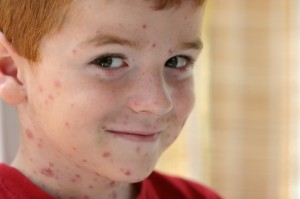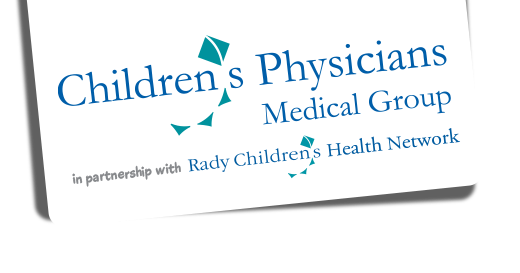
At least 3-4 times a month I get asked about chickenpox, the vaccine, and its protection against and relationship to shingles. Most people have heard about shingles, may even know someone who has had it, seem to know there is some relationship to chickenpox, but don’t fully understand what that relationship is. For that reason, I thought that this would be a good topic to discuss and I could give a quick chickenpox-shingles 101 lesson.
Chickenpox is a member of the herpesvirus family. Humans are the only source of infection for this highly contagious virus. It is spread quite easily from person to person by direct contact, airborne droplets and respiratory secretions (that means sneezing and coughing) and direct contact with vesicular lesions from both chickenpox and zoster (or shingles) lesions. Once you become infected with chickenpox, the varicella-zoster virus never leaves your body, but becomes dormant in your nerve root endings. Reactivation of the virus results in zoster, or “shingles”.
As chickenpox is characterized by an itchy, vesicular rash all over the body, shingles consists of grouped vesicles in 1 to 3 small areas that are innervated by the nerve root ending that the virus reactivated from (these are called dermatomes). Shingles is usually quite painful and can continue to be uncomfortable even after all of the lesions have cleared up.
As mentioned earlier, both the lesions from chickenpox and shingles are highly contagious. Persons with the disease are contagious from 1-2 days before the vesicles are visible and remain contagious until they are all crusted over. Both chickenpox (varicella) and shingles (zoster) cause chickenpox in susceptible children and adults who do not have immunity, either by disease or immunization. Remember, you can’t get shingles without first having chickenpox or the vaccine.
Most parents worry about their kids getting shingles or chickenpox from a family member who has shingles. Most of the time it’s a grandparent. Here’s the good news, most toddlers and children have received their chickenpox vaccine at 12 months of age and a second dose between 4-6 years, and therefore are protected and free to be around that family member. If, however, they are under one year of age or have not received their vaccine, I would recommend avoiding exposure, as they are definitely susceptible to contracting chickenpox.
Does the vaccine protect you from getting shingles? No, but data has shown that the severity of shingles seems to be milder among vaccinated children compared to children that contracted chickenpox the old fashioned way.
How effective is the vaccine? The efficacy of 1 dose is 70-90% against contracting chickenpox and 95% effective against severe disease. Those are some pretty good numbers!
How long does the vaccine keep you protected? The vaccine has only been licensed in the United States since 1995, but current studies from Japan indicate persistence of immunity for at least 20 years.
Finally, does my child really need this vaccine? Yes. Most parents remember getting chickenpox as children. They remember the itching, maybe a fever and some achiness, oatmeal baths, calamine lotion, and missing a week of school. For the most part that is what chickenpox is all about. I too remember all of the above, and I also know that I was single handedly responsible for the majority of my kindergarten class contracting the disease. However, not all cases of chickenpox are harmless. Complications from chickenpox can cause hospitalization and in rare cases death. I saw this first hand during my residency. The 7-year-old boy in the ICU with severe pneumonia and respiratory distress syndrome. He was on a ventilator with multiple chest tubes when I began my rotation and he was still the same, one month later, when I finished. Then the teenage girl with half of the skin on her back removed from the extreme staph skin infection complicating her chickenpox. Finally, the little baby who just turned 18 months, and was in the crusting over phase of his chickenpox when he stopped breathing and died. On autopsy it was discovered that he had a chickenpox lesion in the area of his brain that controls breathing. None of these kids were fortunate enough to have had the chickenpox vaccine because it was not yet available.
Now the good news, since the introduction of the vaccine, the overall rate of hospitalization from chickenpox has declined by 90% and there have been few fatal cases. As with many diseases today we forget how bad they can be. Let’s not forget and instead be thankful that our kids are fortunate to live in an era where they can be protected through vaccination.
11 thoughts on “Chickenpox & Shingles in Children”
Leave a Reply








Great info. Lucky me I recently found your blog by accident (stumbleupon).
I have saved as a favorite for later!
Ok if I get shingles again can it affect an baby in mothers body and will it affect a 9 month old. If my immunity is compromised can I get shingles from a person or child that gets chickenpox
Thanks for your comment but we are unable to offer medical advice here. Please call your physician for assistance.
When my daughter was young, she had chickenpox, not long after she had her poxs, my husband came down with shingles. It was very painful for him due to the fact it was on his face. Could he of caught the shingles because my daught had the poxs? I often have wondered this. Thank you
Thanks for your comment but we are unable to offer medical advice here. Please call your physician for assistance.
I have a question in which I have gotten conflicting answers for. My daughter had her first varicella vaccine when she was a year old, she had shingles at the age of 3 and her pediatrician at the time said not to give her the booster. Now that she is 13, she has a new pediatrician who says she needs the booster is this correct? Or do I go with what the first physician said?
Hi Jill, according to the American Academy of Pediatrics (AAP), your daughter should’ve had her first varicella vaccine between 12-15 months, and her booster between 4-6 years old. Since she didn’t receive her booster, the AAP recommends she get it now. Please reference the AAP’s vaccine guidelines here: https://www.healthychildren.org/English/safety-prevention/immunizations/Pages/Recommended-Immunization-Schedules.aspx
While we cannot give medical advice here, you can educate yourself, but the best possible thing to do is discuss it with your daughter’s pediatrician and follow their advice. Thanks for your comments!
Good article. Mostly accurate. However, a person CAN get shingles without ever having chickenpox.
Hello, here’s a response to your post from one of our physicians, Dr. Jaime Friedman:
Varicella is the primary infection and zoster, or shingles, is a reactivation of the virus after it has been latent in the dorsal root ganglia of the nerve. This is why shingles is only seen in the distribution of the nerve.
It is possible to have a mild enough case of primary infection to be unaware of it or to have latent virus from the live virus vaccine resulting in the virus living in the nerve. The resulting shingles is still reactivation.
As always, consult your own physician or pediatrician with your medical concerns. Thanks for your comments!
Can my child get chicken pox from my Uncle who has shingles? My child was touched by my uncle 2 days ago and he now has spots all over his chest and back. A couple on his face and leg. My son is four and has had ONE of his chicken pox vaccinations but, not the second. Could that be what it is since he hasn’t received his second vaccination yet?
Hi Jenny, yes, it is possible that your child could get chicken pox from your Uncle who has shingles, especially since he has only had one of the vaccines so far. The best thing for you to do is go see your pediatrician asap to confirm he has them. He shouldn’t be in school or daycare until his spots are dried and crusted over. Otherwise, he’s highly contagious, which is why it’s very important for you to confirm with your pediatrician. Hope that helps.